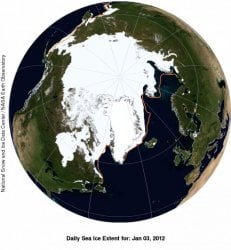daveman
Diamond Member
Fear-monger much?Arctic Sea Ice Gone in Summer Within Five Years?
Just last year two top scientists surprised their colleagues by projecting that the Arctic sea ice was melting so rapidly that it could disappear entirely by the summer of 2040.
This week, after reviewing his own new data, NASA climate scientist Jay Zwally said: "At this rate, the Arctic Ocean could be nearly ice-free at the end of summer by 2012, much faster than previous predictions."
So scientists in recent days have been asking themselves these questions: Was the record melt seen all over the Arctic in 2007 a blip amid relentless and steady warming? Or has everything sped up to a new climate cycle that goes beyond the worst case scenarios presented by computer models?
"The Arctic is often cited as the canary in the coal mine for climate warming," said Zwally, who as a teenager hauled coal. "Now as a sign of climate warming, the canary has died. It is time to start getting out of the coal mines."



